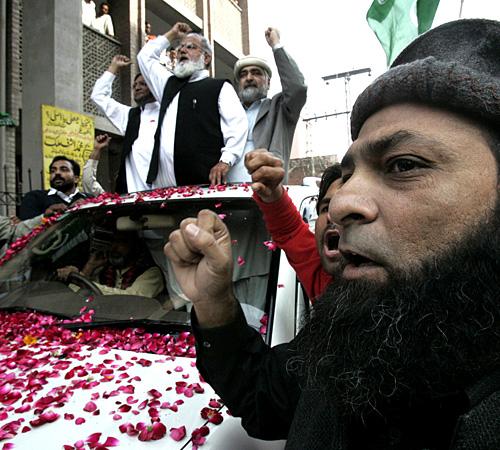Musharraf to retire from army post

November 27, 2007
ISLAMABAD, Pakistan – Pervez Musharraf will retire as chief of Pakistan’s army at midweek, his aides announced Monday as the embattled leader grappled with a political scene roiled by the return of an exiled former prime minister in time for crucial January elections.
Nawaz Sharif, who was ousted by the 1999 coup that put Musharraf in power, quickly registered Monday to run in the election although he didn’t drop his call for a boycott that could undermine the ballot’s legitimacy.
Sharif appealed for support from Pakistanis unhappy with Musharraf’s U.S. alliance, portraying himself as a politician who kept himself at arms length from Washington in contrast to the U.S.-friendly stance of the president and the other key opposition leader, Benazir Bhutto.
Even before Sharif’s return Sunday, Musharraf was under pressure from opposition forces and the U.S. to end the emergency rule he imposed three weeks ago in this nuclear-armed nation of 160 million people beset by strengthening Islamic militants.
America and its allies want Musharraf to lift his suspension of the constitution to ensure a fair election, which they hope will produce a moderate government willing and capable of standing up to religious extremists with ties to al-Qaida and the Taliban.
Get The Daily Illini in your inbox!
Musharraf has eased the crackdown on dissent that saw police detain thousands of opponents and take independent TV news off air, and his aides announced Monday that he was now ready to take the long-promised step of quitting his powerful army post and ending direct military rule.
Spokesman Rashid Qureshi said Musharraf would make “farewell visits” to his troops before ending a military career that began in 1964. Musharraf planned to promote his anointed successor, Gen. Ashfaq Kayani, to the military chief’s post Wednesday, the aide said.
The following day, “he will take oath of office as president of Pakistan as a civilian,” Qureshi said.
Musharraf suspended the constitution Nov. 3, saying he needed to stop the Supreme Court from creating political chaos and hampering the effort against militants.
The crackdown caused a break in relations between Musharraf and Bhutto, leader of the country’s biggest opposition party who was twice put under house arrest to stop her from leading mass rallies against the unpopular general.
Bhutto and Musharraf have since eased their public feuding, and she filed her candidacy papers in her home district of Larkana on Monday.
She contended the election is stacked in favor of Musharraf’s ruling party, but said she wouldn’t participate in a boycott of the vote unless all opposition groups did – a tall order given the fractious relations among Pakistan’s many political blocs.
Bhutto’s spokesman, Farhatullah Babar, said Musharraf would be taking a major step forward by shedding his uniform, and if he made significant further concessions “then the window for negotiations can be reopened.”
Sharif’s return has given Musharraf a new headache because of the bad blood between them and the political threat Sharif poses in Punjab province, Pakistan’s political heartland.
Sharif flew in Sunday with the apparent blessing of Saudi Arabia, an influential ally of Pakistan that had previously supported Musharraf’s efforts to keep Sharif in exile there.
Associated Press writers Zarar Khan and Slobodan Lekic in Lahore, Ashraf Khan in Larkana, Stephen Graham in Islamabad and AP Television News producer Andrew Drake in Rawalpindi contributed to this report.






